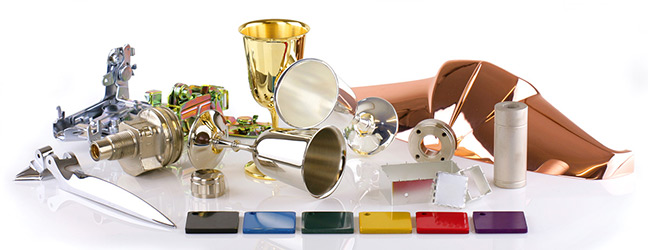The Difference Between Ferrous and Non-Ferrous Metals?
There are various categories in which different metals fall under. From magnetic, to non-magnetic, ductile or brittle, each metal has its own suitable use. Ferrous and non-ferrous metals both differ in their composition and purposes. In order to use them appropriately and for electroplating services, it is important to be able to distinguish between the two. Learn the difference between ferrous and non-ferrous metals in our blog below.
Ferrous Metals
Metals which contain iron are known as ferrous metals. This means that they are made up of a large percentage of this element. Ferrous metals are known for being robust and durable, which is why they are often used in multiple applications. These range anywhere from industrial fabrication, to architectural, residential, and more. The iron composition also makes these types of metals magnetic.
Ferrous metals which fall under this category include:
- Steel:
Used in manufacturing, construction, engineering, and automotive industries.
- Stainless Steel:
One of the most hard-wearing and utilised metals. Stainless steel is used to manufacture various tools and appliances.
- Alloy Steel:
Most often used in construction-related manufacturing, electrical components and machine tools.
- Carbon Steel:
Because of its rigidity, this is used for manufacturing machine tools such as blades and drills.
- Cast Iron:
With the ability to be both strong and brittle, this metal can be used for manufacturing manhole covers and engine blocks.
- Wrought Iron:
In general, this metal is used for producing chains, railings and barbed wire.
Even with strong enduring metals like steel and iron, electroplating services are used to prolong resistance. Despite being classed as ferrous metals, specific plating metals will be suitable for some and not for others. For example, bright nickel plating is often used for stainless steel as it maintains the appearance and wear resistance. Similarly, zinc plating is used to create a protective barrier from corrosion and rust. This is why pairing with the right plating metal is essential for longevity and maximising performance.
Non-Ferrous Metals
Metals which do not contain a significant amount of iron are called non-ferrous metals. Despite being typically less strong than ferrous metals, non-ferrous metals also have their own benefits. Metals in this group have a higher resistance to corrosion and rust, as well as being more malleable.
Examples of non-ferrous metals:
- Copper:
Highly conductive for electricity and heat, copper is used when manufacturing wires, cooking pots, automobile radiators and much more. Because of this, electroplating copper is suitable for various types of metals.
- Aluminium:
Although lower in strength, aluminium is lightweight which is why it is used for manufacturing food cans and aircraft components.
- Brass:
A combination of zinc and copper, brass is often used for manufacturing electrical fittings, ornaments and furniture fittings such as cabinet handles.
- Zinc:
One of the strongest non-ferrous metals, zinc plating solutions are used to prevent iron and steel from rusting.
- Tin:
Even more malleable than aluminium, tin is wifely used to plate steel cans which contain food.
- Lead:
This metal is most often found in batteries, electrical power cables, and building construction due to being highly resistant to corrosion.
The Difference Between Ferrous and Non-Ferrous Metals
Ultimately, the difference between ferrous and non-ferrous metals is that one group has iron included in their composition. Each having their own benefits, it’s hard to call one superior to the other. When choosing metal fabrication or electroplating services, the key is to match the most suitable metal for your function.
Where to Find Electroplating Services
In search of an electroplating company? Dorsetware have the knowledge and expertise in providing electroplating services. Whether you are looking for a zinc plating solution, electroplating copper or another metal, contact us today. We can provide the best recommendations for which metals to use for your purpose. Give us a call on 01202 677 939 if you wish to talk to one of our friendly experts.


